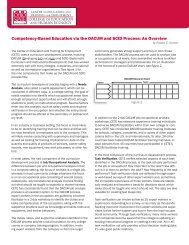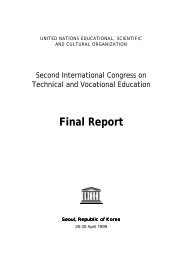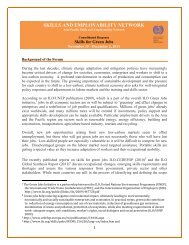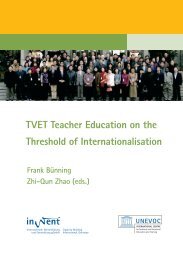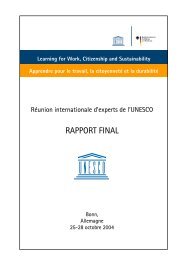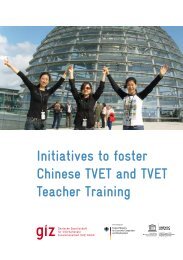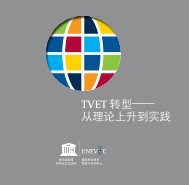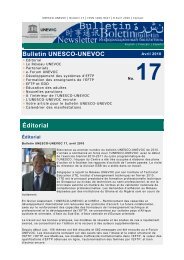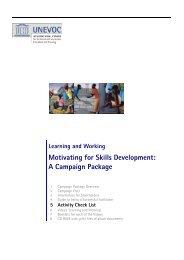Corporate HRD and Skills Development for ... - Unesco-Unevoc
Corporate HRD and Skills Development for ... - Unesco-Unevoc
Corporate HRD and Skills Development for ... - Unesco-Unevoc
You also want an ePaper? Increase the reach of your titles
YUMPU automatically turns print PDFs into web optimized ePapers that Google loves.
BACKGROUND 1:<br />
<strong>Skills</strong> <strong>Development</strong> <strong>for</strong> Employment:<br />
Scope <strong>and</strong> Strategies<br />
Joachim Wagner<br />
Towards Knowledge- <strong>and</strong> <strong>Skills</strong>-Based Economies <strong>and</strong> Societies:<br />
New Objectives <strong>and</strong> Challenges Concerning Human Resources <strong>Development</strong> <strong>and</strong> Training<br />
A critical challenge society faces at the start of the twenty-first century is the attainment of full<br />
employment <strong>and</strong> sustained economic growth in a global economy <strong>and</strong> society. This challenge has<br />
recently become even more complex <strong>and</strong> dem<strong>and</strong>ing. Economic, social, <strong>and</strong> technological change is<br />
gathering pace <strong>and</strong> dem<strong>and</strong>s continuous policy <strong>and</strong> institutional adaptation in order to meet new<br />
needs <strong>and</strong> to seize the opportunities that are rapidly opening up in a world economy. It has been<br />
increasingly recognized that people’s endowment of skills <strong>and</strong> capabilities, <strong>and</strong> their investment in<br />
education <strong>and</strong> training, constitute the key to economic <strong>and</strong> social development. <strong>Skills</strong> <strong>and</strong> training<br />
increase productivity as well as incomes. They also facilitate everybody’s participation in the<br />
economic <strong>and</strong> social fabric of society 1 .<br />
However, the difficulties involved in putting into effect employment <strong>and</strong> growth-oriented policies<br />
that give high priority to education <strong>and</strong> training are <strong>for</strong>midable. Some countries are investing heavily<br />
in their human resources, e.g. advanced countries <strong>and</strong> rapidly industrializing countries (e.g. the<br />
Republic of Korea, Singapore, <strong>and</strong> others). Other countries, particularly poor countries, have not<br />
been able to maintain investments at sufficiently high levels to meet their burgeoning needs.<br />
Unless these poorer countries, supported by the international community, implement effective<br />
policies <strong>for</strong> education <strong>and</strong> training <strong>for</strong> all, the skills gap is likely to grow even wider. According to the<br />
International Labour Organization (ILO), the overall goal of the global economy should be to provide<br />
opportunities <strong>for</strong> all people to obtain decent <strong>and</strong> productive work under conditions of freedom,<br />
equity, security, <strong>and</strong> human dignity. This requires the attainment of four strategic objectives that are<br />
vital to social progress: employment creation, supported by increased <strong>and</strong> effective investment in<br />
human resources development, learning <strong>and</strong> training <strong>for</strong> the employability, competitiveness, growth<br />
<strong>and</strong> social inclusion of all; promoting fundamental rights at work; improving social protection; <strong>and</strong><br />
strengthening social dialogue. The ILO’s framework of decent work addresses both the quality <strong>and</strong><br />
quantity of employment. It provides the basis <strong>for</strong> a new type of human resource development <strong>and</strong><br />
training policies.<br />
1 ILO Report, ISBN 92-2-112876-8, ISSN 0074-6681<br />
2



